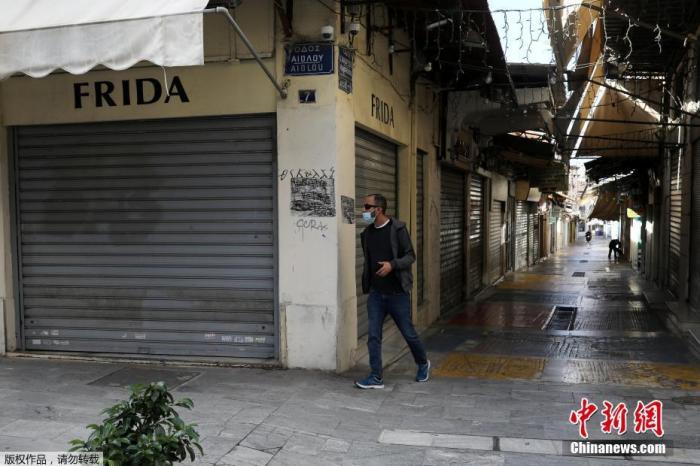China News Service, February 19, according to the Greek "China-Greece Times" report, on the evening of February 18 local time, the Greek National Public Health Organization announced that in the past 24 hours, there were 1,400 new confirmed cases of new crown in Greece, with a total of 176,059 confirmed cases. ; There were 27 new deaths, with a total of 6221 deaths.
According to the "traffic light" map of the new crown epidemic released by the European Center for Disease Control and Prevention (ECDC) on the 18th, the green areas in Greece have disappeared, and the epidemic in some areas, including Attica, is severe.
In order to effectively control the epidemic, the Greek Government Medical Expert Committee may recommend to the government to extend the blockade measures for several weeks.
Data Map: On November 7, 2020, local time, in Athens, Greece, a policeman is checking the driver's certificate to determine the purpose of his trip.
Greece's epidemic map no longer has a "green zone"
ICU in Attica is nearly full
According to the latest "traffic light" map of the new crown epidemic released by the European Center for Disease Control and Prevention (ECDC) on the 18th, the epidemic situation in most European countries is still severe.
In Greece, the green areas that appeared before have also disappeared on this map.
According to the data on the map, currently the most severely affected areas in Greece include Attica, Evia and Peloponnese.
Greece’s Minister of Health, Kikilias, said at the epidemic briefing on the 17th that the number of new cases of new crowns in some areas of the country is on the rise.
The health and medical system is still under great pressure, especially in the Attica area where the capital Athens is located. As of noon on the 17th, the occupancy rate of the new crown intensive care unit (ICU) has reached 85%.
Data map: Pedestrians pass by a closed commercial street in Athens, Greece.
Miracle of life
New coronary severely ill patient discharged after 51 days of intubation treatment
On February 18, local time, a 69-year-old severely ill patient with COVID-19 in Greece was discharged from a hospital in Kozani and went to a rehabilitation center after receiving 51 days of intubation.
51 days ago, the 69-year-old new crown patient was transferred to the intensive care unit from the pathology clinic of the Mamasio Hospital in Kozani due to worsening symptoms.
Since this patient himself had a basic disease, after being transferred to the intensive care unit, the struggle with the illness was particularly difficult.
However, the medical workers did not give up on this patient. After nearly two months of intubation treatment, his health successfully reached the discharge standard.
Stelgios Ganassios, Dean of Mamasio Hospital, said: “On behalf of all the staff of the hospital, we wish him health and happiness from now on, and happiness and happiness for his family.”
Data map: On November 7, 2020, local time, a cat was strolling on an empty commercial street during Greece's national lockdown.
Greece continues to promote new crown vaccination
Experts may suggest extending the lockdown for several weeks
Due to heavy snowfall, the Greek government previously announced that it would postpone the vaccination work originally scheduled for the 16th.
The Secretary-General of the Ministry of Health in charge of primary health care Simistokes said on the 17th that Greece will vaccinate people who have not been vaccinated on the 16th next week.
Simistokes also pointed out that although the vaccination for ordinary people was cancelled due to weather on the 16th, the vaccines were not wasted.
This batch of vaccines has been used to vaccinate prisoners and guards in Korydallos prison in Athens.
He also pointed out that as of the 17th, the health authorities had completed 660,000 vaccinations, equivalent to covering 5.71% of the population of Greece.
In order to effectively control the epidemic, the Greek government announced earlier that from February 11 to 28, it would implement a "hard core blockade" measure on the Attica region, including Athens.
The government medical expert committee is likely to recommend to the government to extend the blockade measures for several weeks at a regular meeting held on the 19th.
(Cai Ling and Xu Yining)

